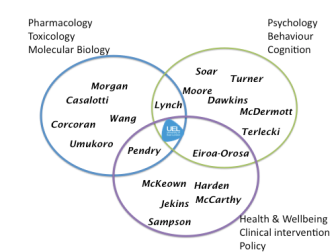Our network includes staff from the Schools of Psychology, Health Sport and Bioscience, Law and Social Science, Education and Communities, Institute for Research of Child Development, Institute for Health and Human Development, and Student Services.
Dr. Stefano Casalotti: Cellular and molecular mechanisms of drug addiction. Currently focusing on the effect of alcohol on the gene expression of G proteins in Drosophila (fruit fly) model of drug addiction.
Prof. Olivia Corcoran: Understanding the pharmacology, toxicology and bioanalytical chemistry of regulated and unregulated psychoactive substances in diverse communities: alcohol, caffeine, nicotine (e-cigarettes for smoking cessation), natural products and traditional phytomedicines.
Dr. Lynne Dawkins: has over 15 years’ experience of working with smokers in research contexts and, more recently, with novice and experienced e-cigarette users. Lynne is one of the UK’s leading authorities on e-cigarettes having published papers on e-cigarette use, effects, and nicotine delivery and disseminated her findings widely via academic conference, public lectures and online media.
Dr. Francisco Jose Eiroa-Orosa is interested in understanding psychosocial wellbeing in the context of complex multidimensional problems such as addictions, trauma, migration or social change. In the field of addiction he has been active in the study of opiates, cocaine, interaction of genetic and psychosocial determinants and cultural and social consumption patterns.
Prof. Angela Harden: Areas of interest include mental health, health inequalities, the wider determinants of health and the evaluation of complex interventions.
Dr. Gary Jenkins : NHS consultant psychiatrist assessing students with mental health problems at UEL, Queen Mary University and London School of Hygiene and Tropical Medicine
Dr. Stephanie Lynch: (PhD student 2011-2015) Doctoral research investigated at symptoms and aspects of psychosis in regular cannabis users. Graduated 2015)
John McCarthy: Mental health co-ordinator and co-head of Student Health and Wellbeing at UEL. Actively involved in assessing and advising students with mental health issues. Specialist interests are in cognitive behaviour therapy, dual diagnosis, early interventions with psychosis and relapse prevention.
Prof. Mark McDermott: Differences between people in their resistance to health persuasion messages and how to construct messages that take account of and overcome such resistance, and thereby which facilitate the construction of more effective public health campaigns. Also interest in reducing the frequency of episodes of risky drinking.
Dr. Olive McKeown: Expertise in designing curricula for undergraduate, postgraduate and other courses in substance misuse (drugs and alcohol), dual diagnosis (substance misuse and mental health), health promotion and wellbeing, harm reduction, motivational techniques, detoxification and stabilisation, relapse-prevention, individual and family interventions as well as organizational, management and leadership issues related to practice / service delivery. Current research interest include effective interventions for harm reduction from substance misuse.
Prof. Derek Moore: Long-term effects of prenatal ‘recreational’ drug exposure on the development of infants, and exploring the development of infants, in particular the relationship between their cognitive abilities and their social development.
Dr Winston Morgan: Toxicity of amphetamine related compounds (MDMA) and the mechanism of action of psychoactive substances.
Dr Barbara Pendry: Previously worked as Mental Health Act Manager for Barnet, Enfield and Haringey Mental Health Trust. Areas of interest include substance abuse and herbal medicine.
Dr Alice Sampson: The impact of government social policies: evaluation; criminality and crime prevention; women, young people and minority ethnic communities. Evaluation studies include Stratford City Challenge, Safer Cities, eight Single Regeneration Budget programmes in East London, the Youth Inclusion Programme, Home Office initiatives to stop domestic violence, and the Children’s Fund and Sure Start programmes
Dr. Kirstie Soar: Cognitive and psychobiological effects of recreational (non-dependent) drug use: specifically, recreational cocaine use and whether users demonstrate psychosis-like symptoms and associated cognitive deficits, and long term psychological effects associated with MDMA/ecstasy. Other interests include the psychological correlates of Novel Psychoactive Substances (NPSs)
Dr Tian Jun Wang Acupuncture treatment, clinical trial, mental health, serotonin and its reuptake in the brain.
Dr. Meredith Terlecki: Brief motivational interventions, etiology and treatment of co-occurring substance use and affective disorders. Clinical interests include harm reduction, cognitive behavioural therapy, relapse prevention, motivational interviewing, and mindfulness techniques.
Dr. John Turner: Recreational drug effects on cognition, health/mental health, motivated behaviours (including MDMA/Ecstasy, cannabis, ketamine, alcohol and nicotine) Biological factors in health and mental health (esp. depression and anxiety), and use of substances during pregnancy and effects on infant development
Dr.Oghenetega Umukoro: (PhD Student 2012-15) Investigated the effect of alcohol on the gene expression of G proteins in the fruit fly (Drosophila melanogaster). Graduated July 2015
Dr. James Windle International drug policy and strategy, and organized crime. Has written on the potential role of the International Criminal Court in countering illicit opiate trafficking, the Afghan criminal justice system, and displacement in counter-narcotic interventions.

